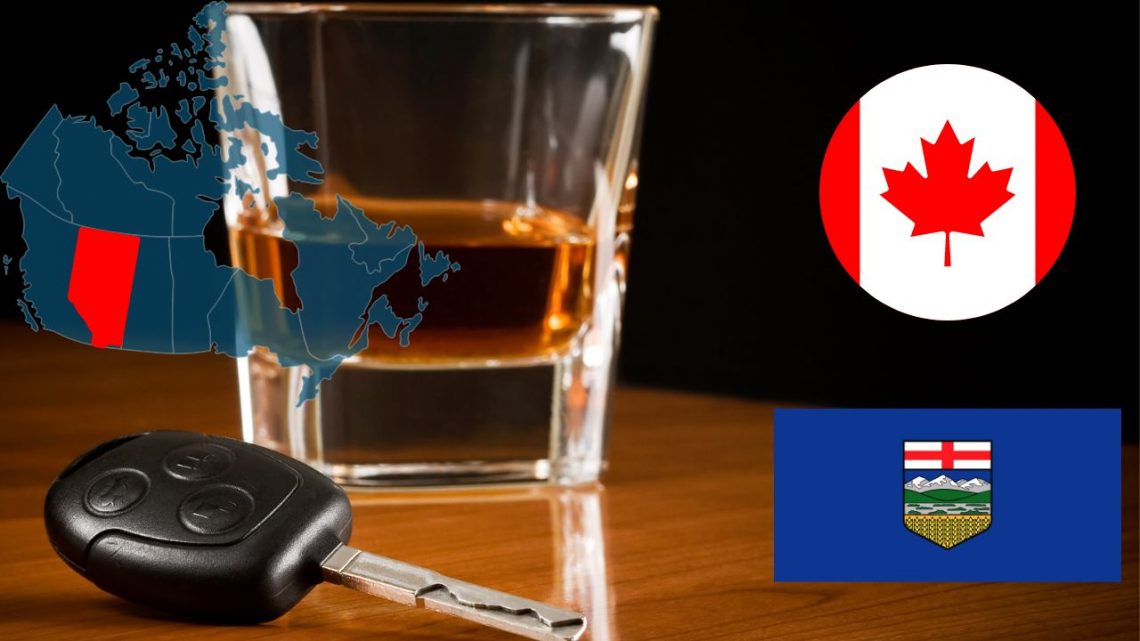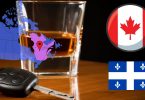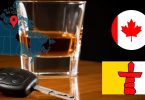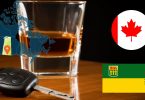In Alberta, the maximum allowable blood alcohol concentration (BAC) is set at 0.05%, or 50 milligrams per 100 milliliters of blood. This threshold is more stringent than those found in many other Canadian provinces.
Before we discuss how much alcohol is authorized while driving in Alberta, please know that the purpose of this article is purely educational. It should not be interpreted as an encouragement to drink and drive.
We recommend taking a cab or hiring a designated driver if you must travel after drinking. It is also essential to be updated with the current laws related to impaired driving, so regularly checking the province’s official website is a must.
What is the legal alcohol limit for driving in Alberta?
In Alberta, the legal alcohol limit for drivers varies based on the type of license and the driver’s experience. These limits are designed to enhance road safety by imposing strict regulations on the consumption of alcohol before driving. Below is a breakdown of the legal Blood Alcohol Concentration (BAC) limits for different categories of drivers:
- Regular Drivers: The legal limit is 0.05% BAC. This applies to most drivers who hold a standard operator’s license.
- Commercial License Holders: For drivers with a commercial license, the legal limit is 0% BAC, meaning no detectable alcohol is allowed in their system while operating a vehicle.
- New and Graduated Drivers: It is illegal for these drivers to operate a vehicle with any detectable amount of alcohol in their system. This zero-tolerance policy aims to ensure the safety of inexperienced drivers and others on the road.
Drink and Drive Penalties and Punishments in Alberta
In Alberta, the consequences of impaired driving are severe, governed by the Immediate Roadside Sanctions (IRS) under the Traffic Safety Act and, where applicable, further penalties under the Criminal Code of Canada. Once a Notice of Administrative Penalty is issued, the driver faces immediate license suspension or disqualification, with a Confirmation of Suspension sent to the driver’s last known address.
It’s crucial to note that all instances of DUI, whether influenced by alcohol, drugs, fatigue, prescription drugs, or a combination thereof, signify impaired driving. Repeat offenses indicate a pattern of high-risk behavior, leading to increasingly severe penalties.
To remain informed and compliant, regularly reviewing the official state website for updates is advisable. Below is an outline of the penalties for various offenses:
IRS 24-hour suspension:
- Immediate driver’s licence suspension for 24 hours if suspected of impairment by alcohol, drugs, or a condition affecting driving safety.
IRS WARN penalties (BAC between 0.05 and 0.079 or failing sobriety tests):
- First occurrence:
- 3-day driver’s licence suspension
- 3-day vehicle seizure
- $300 fine plus a 20% victim fine surcharge
- Second occurrence:
- 15-day driver’s licence suspension
- 7-day vehicle seizure
- $600 fine plus a 20% victim fine surcharge
- Remedial education through Crossroads or Planning Ahead courses
- Third occurrence:
- 30-day driver’s licence suspension
- 7-day vehicle seizure
- $1,200 fine plus a 20% victim fine surcharge
- Remedial education through the IMPACT Program
IRS FAIL penalties (BAC of 0.08 or more, failing or refusing tests):
- First occurrence:
- 90-day absolute suspension, followed by a 12-month suspension with the option to join the Ignition Interlock Program
- Complete Planning Ahead course
- 30-day vehicle seizure
- $1,000 fine plus a 20% victim fine surcharge
- Second occurrence:
- 90-day absolute suspension, followed by a 36-month suspension with the option to join the Ignition Interlock Program
- Complete the IMPACT Program
- 30-day vehicle seizure
- $2,000 fine plus a 20% victim fine surcharge
- Third occurrence:
- 90-day absolute suspension, followed by a potential lifetime suspension with eligibility for reinstatement after 10 years
- 30-day vehicle seizure
- $2,000 fine plus a 20% victim fine surcharge
Novice driver penalties (zero tolerance under IRS ZERO: Novice Program):
- 30-day driver’s licence suspension
- 7-day vehicle seizure
- $200 fine plus a 20% victim fine surcharge
Commercial driver penalties (zero tolerance under IRS ZERO: Commercial Program):
- First occurrence:
- 3-day driver’s licence suspension
- $300 fine plus a 20% victim surcharge
- Second occurrence:
- 15-day driver’s licence suspension
- $600 fine plus a 20% victim surcharge
- Third occurrence:
- 30-day driver’s licence suspension
- $1,200 fine plus a 20% victim surcharge
Given the severity of these penalties, it is paramount for drivers in Alberta to adhere strictly to the legal alcohol limits and to stay updated on any changes by consulting the official province website frequently.
How Can I Calculate if My Alcohol Blood Limit is Legal in Alberta
In Alberta, law enforcement officers determine if drivers are within the legal Blood Alcohol Concentration (BAC) limits through roadside testing, including breathalyzers and field sobriety tests. These methods are used to assess if a driver’s BAC exceeds the legal thresholds of 0.05% for regular drivers, 0% for commercial drivers, and any detectable alcohol for new and graduated drivers.
As an experienced phlebotomist with a decade of expertise, I recommend two reliable methods to check your BAC level, helping ensure you stay within Alberta’s legal limits:
- Use a High-Quality Alcohol Breathalyzer: Based on professional insights, the BACtrack S80 is a standout choice available in Alberta. It’s celebrated for its Professional-Grade Accuracy and comes DOT & NHTSA Approved, alongside FDA 510(k) clearance. Keeping a device like the BACtrack S80 in your vehicle is wise, as it can provide a quick, reliable estimate of your BAC, helping you make informed decisions about driving. The convenience and accuracy of this breathalyzer make it an essential tool for those who wish to ensure they’re not inadvertently driving impaired.
- Leverage a BAC Calculator: I’ve collaborated with fellow phlebotomists and web developers to create an accessible online BAC calculator. This tool factors in various elements, such as your weight, the type and amount of alcohol consumed, and the time elapsed since drinking, to estimate your BAC. While it offers a practical means to gauge your alcohol levels, remember that like any estimation tool, it cannot account for every variable affecting BAC.
It’s crucial to understand that both these methods provide approximate values and cannot guarantee 100% accuracy due to individual physiological differences and potential device calibration issues. However, they serve as valuable resources in helping you assess whether you’re approaching or exceeding the 0.05% BAC limit, thus aiding in the prevention of drunk driving.
Remember, the safest approach is to avoid driving if you’ve consumed alcohol or if there’s any doubt about your sobriety. By staying informed and utilizing available tools to monitor your BAC, you contribute to safer roads for everyone in Alberta.
Ways to Avoid Driving with a High BAC in Alberta
Driving with a high Blood Alcohol Concentration (BAC) not only puts your safety at risk but also that of others on the road. Thankfully, there are convenient and responsible alternatives to driving under the influence in Alberta. Here are some recommendations to ensure you stay safe and within the legal limits:
- Utilize Ride-Sharing Apps and Local Taxi Services: Modern technology offers an easy solution to avoid driving after drinking. Apps like Uber and Lyft provide a convenient way to get a ride with just a few taps on your smartphone. Additionally, supporting local taxi companies is a great option. For instance, in Calgary, you can rely on Delta Cab Ltd., while Anytime Taxi serves those in Edmonton. These services are readily available and can take you safely to your destination without the risk of driving impaired.
- Opt for Designated Driver Services: If you find yourself in a situation where you’ve driven to a location but have consumed too much alcohol to drive back safely, consider using a designated driver service. These services offer a professional driver to drive you and your car back home. In Calgary, Dial A Driver Calgary is a reputable choice, and in Edmonton, Dedicated Designated Drivers Inc. offers similar services. A simple online search for “designated driver service” followed by your city’s name will provide you with options available in your area.
Employing these alternatives not only helps you avoid the severe penalties associated with driving over the legal BAC limit in Alberta but also ensures that the roads are safer for everyone. Always plan ahead and choose a responsible way to get home if you’ve been drinking. It’s a small step that can have a significant impact on your safety and the well-being of the community.
Safe Driving in Alberta
In Alberta, the statistics are sobering: one in six drivers involved in fatal accidents had been drinking prior to the collision. This has prompted the Alberta government to enact stringent laws against drunk driving, aimed at deterring such behavior and removing impaired drivers from the roads. These laws underscore that while drinking and driving isn’t outright banned, there is a strict legal limit on the permissible blood alcohol concentration (BAC).
The existence of a legal BAC limit doesn’t provide a free pass to drive after drinking. With the variety of safe transportation alternatives available, there’s no justification for risking impaired driving. Opting for a cab, public transportation, or ride-hailing services like Uber or Lyft is always safer after consuming alcohol.
To ensure compliance with Alberta’s traffic laws and personal safety, individuals should monitor their BAC if they choose to drive. Using a reliable breathalyzer can help gauge whether one is within the legal limit, though the safest approach is to avoid driving altogether if alcohol has been consumed.








Leave a Comment
You must be logged in to post a comment.